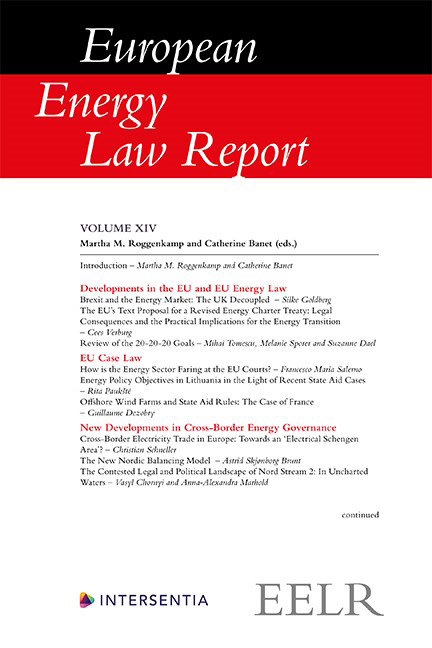Introduction
Published online by Cambridge University Press: 26 May 2022
Summary
The European Energy Law Report XIV presents an overview of the most important developments in the field of international, European Union (EU) and national energy and climate law as discussed at the 31st European Energy Law Seminar, which was held on 20 and 21 January 2020 at The Hague in the Netherlands. Although a wide range of topics and developments were discussed at the seminar, we recognise that the common thread was energy transition and cross-border energy activities and impacts. These issues are discussed in the five parts of this volume. As a preliminary matter, the book starts by presenting three developments that will have an impact on the EU and EU energy law (Part I). These are to start with Brexit and the effects on the EU energy market, and subsequently the possible revision of the Energy Charter Treaty and how this may impact the process of energy transition, and finally the compliance dynamic instaured by the EU’s 20-20-20 goals. Part II then concentrates on EU case law and Commission decisions in State aid cases in relation to renewable energy sources and energy transition measures (particularly offshore wind). Part III reviews some key legal and market developments as well as new infrastructure projects aiming at ensuring cross-border energy flow in Europe. The two final parts discuss new developments relevant for energy transition: in Part IV, the concept of energy communities and how this translates into EU and national law; and, in Part V, the production and use of green hydrogen in the EU and the North Sea area.
DEVELOPMENTS IN THE EU AND EU ENERGY LAW
Brexit has been a topic discussed at the European Energy Law Seminar for several years. In the previous Energy Law Report, Silke Goldberg wrote a chapter entitled ‘Brexit and Its Impact on the Energy Sector: Pulling the Plug?’. Since December 2020, the question can be answered and Chapter I analyses the consequences of the United Kingdom (UK) pulling the plug.
- Type
- Chapter
- Information
- European Energy Law Report , pp. 1 - 8Publisher: IntersentiaPrint publication year: 2021

